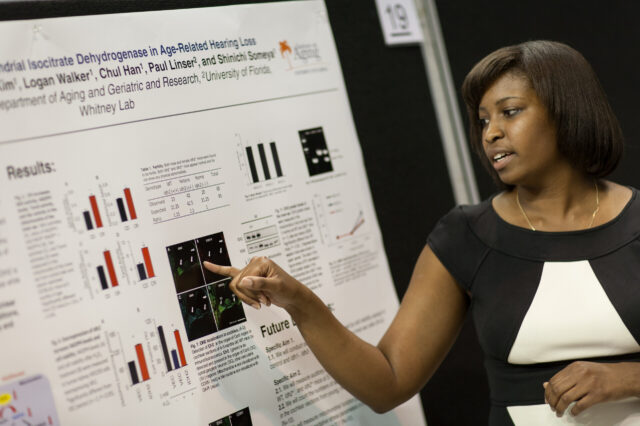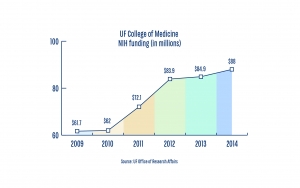UF College of Medicine increases NIH funding in 2014

At a time when garnering National Institutes of Health research funding has proved challenging for many institutions across the country, the University of Florida College of Medicine has increased its NIH grant funding for the fifth consecutive year.
“This continued advancement in research funding shows that we are achieving our goal of becoming a national leader in clinical and basic research,” said David S. Guzick, M.D., Ph.D., UF senior vice president for health affairs and UF Health president. “Thanks to the innovative work of College of Medicine faculty and staff, the college has achieved enduring and consistent growth in research over the past five years. This growth in research funding allows UF Health to have a direct impact on the lives of patients through advances in the diagnosis, prevention and cure of diseases.”
 In 2009, the UF College of Medicine received $61.7 million in funding. Since then, the grant awards continued to rise, even when the budget of the NIH itself decreased. In 2010, the college’s funding rose to $62 million, and in 2011, the funding jumped to $72.1 million. In 2012, the funding was $83.9 million; in 2013, $84.9 million and in 2014, $88 million.
In 2009, the UF College of Medicine received $61.7 million in funding. Since then, the grant awards continued to rise, even when the budget of the NIH itself decreased. In 2010, the college’s funding rose to $62 million, and in 2011, the funding jumped to $72.1 million. In 2012, the funding was $83.9 million; in 2013, $84.9 million and in 2014, $88 million.
“UF has increased its NIH funding during a time period when NIH funding nationally has been essentially flat,” said Stephen P. Sugrue, Ph.D., senior associate dean for research affairs at the UF College of Medicine. “The increasing in our funding is solely because of the outstanding research programs, initiatives and new ideas of our faculty, and their ability to write and submit competitive grant proposals. "The job of the dean’s office has been to just put the best resources together with the best teams possible.”
Although UF has been courting an influx of new faculty as part of its preeminence initiative — which seeks to push UF to a top-10 public research university in the nation — the increase in funding came largely before any of the new hires were in place.
The NIH funding has also helped the UF College of Medicine jump in the Blue Ridge Institute for Medical Research rankings from 58 in 2009 to 43 in 2014.
“Our continued increase in NIH funding the direct result of the hard work and innovation of our faculty. Their increased focus on interdisciplinary work leads to compelling research, paving the way for medical discovery and for taking the best possible care of our patients,” said Michael L. Good, M.D., dean of the College of Medicine.
Sugrue said UF’s focus on cross-disciplinary research may help bring in larger grants than are typically awarded to single researchers. Team science uses a collaborative approach to study a medical question, using perspectives from many different areas of research.
For example, late in fiscal year 2014, the NIH awarded UF $2.3 million per year for five years to create the UF Sepsis and Critical Illness Research Center, led by Frederick A. Moore, M.D., head of the new center and chief of acute care surgery at UF Health. This grant money came from a funding mechanism reserved for centers that use a multidisciplinary approach to study a specific disease or biomedical problem area.
Clayton E. Mathews, Ph.D., associate professor in the department of pathology, immunology and laboratory science, and Desmond A. Schatz, M.D., pediatric diabetes medical director of the UF Diabetes Institute, received grants totaling $3.1 million and $1.4 million, respectively, for investigating Type 1 diabetes. The National Institute of Diabetes and Digestive and Kidney Diseases, which is part of the National Institutes of Health, awarded these grants.
Other large grants announced this year include a $1.1 million award to Ashley Brown, Ph.D., to study hepatitis C therapies. Arnold Louie, M.D., received $1 million to identify ways to treat tuberculosis.
“We hope to provide a stimulating environment to maximize the effect of the funding,” Sugrue said. “With the momentum we have going right now, we’re looking forward to next year and seeing the first impact of the preeminence hires.”